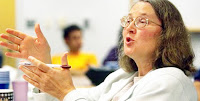
Three American scientists won the 2009 Nobel prize for medicine or physiology on Monday for their discovery of how chromosomes are copied and protected, work that cast light on cancer and the aging process.
Australian-born Elizabeth Blackburn, British-born Jack Szostak and Carol Greider won the prize of 10 million Swedish crowns ($1.42 million), Sweden's Karolinska Institute said.
The institute said the three had "solved a major problem in biology," namely how chromosomes were copied completely during cell division and protected against degradation.
"The discoveries ... have added a new dimension to our understanding of the cell, shed light on disease mechanisms, and stimulated the development of potential new therapies," it said.
The ends of chromosomes are called telomeres and if these are shortened, cells age.
Scientists had speculated that this process could be the reason for aging, not only in individual cells but also in an organism as a whole.
"But the aging process has turned out to be complex and is now thought to depend on several different factors, the telomere being one of them. Research in this area remains intense," the institute said.
The trio's work on telomerase, an enzyme made by little caps on the end of chromosomes, stimulated the development of new therapeutic strategies, it added.
Blackburn is with the University of California, San Francisco, Greider is with the Johns Hopkins School of Medicine in Baltimore and Szostak is at the Massachusetts General Hospital in Boston.
Medicine is traditionally the first of the Nobel prizes awarded each year.
The prizes for achievement in science, literature and peace were first awarded in 1901 accordance with the will of dynamite inventor and businessman Alfred Nobel.

